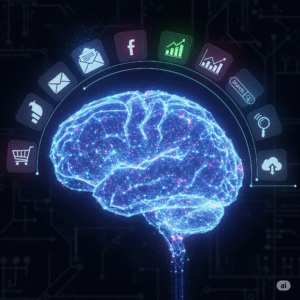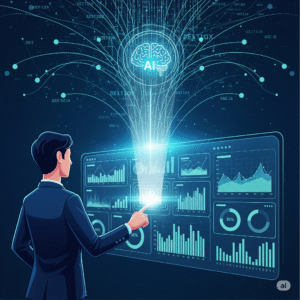In an industry built on dreams and experiences, generic marketing just doesn’t cut it anymore. Today’s travelers, armed with smartphones and endless options, crave journeys that are as unique as they are. This is where AI travel marketing steps in, transforming the way travel brands connect with their customers. From the moment a person starts dreaming of a vacation to the moment they return home, AI is working tirelessly behind the scenes to make every interaction seamless, personal, and relevant.
What AI means for travel—now and in the future
This isn’t about replacing the human touch of travel agents or concierge services. Instead, it’s about empowering travel businesses, from global airlines to boutique hotels, with the tools to understand their customers on a deeper level. By using AI to craft personalized itineraries, deliver timely offers, and provide 24/7 support, companies can create experiences that not only drive bookings but also build long-lasting loyalty. In this comprehensive guide, we’ll explore how to harness the power of travel marketing with AI to captivate your audience, improve efficiency, and ultimately, grow your business. We’ll explore real-world applications, a list of powerful tools, and actionable tips to help you get started.
Understanding the Revolution: AI for Tourism
The travel industry is a data-rich environment, generating a constant stream of information from flight searches, hotel bookings, social media posts, and customer reviews. For a human, sifting through this mountain of data to find meaningful insights is nearly impossible. However, AI thrives on this challenge. AI for tourism uses advanced algorithms and machine learning to analyze these data points, identifying patterns and predicting traveler behavior with incredible accuracy.
This intelligence allows travel companies to move from a reactive to a proactive model. Instead of waiting for a customer to search for a flight, AI can predict when and where a person is likely to travel based on their past behavior and demographic data. This foresight enables brands to deliver hyper-targeted campaigns and promotions that feel less like an ad and more like a helpful suggestion. For instance, a recent report from the Boston Consulting Group (BCG) highlighted that 59% of Indian travelers are already using AI tools to help plan their trips, with this trend being particularly strong among younger generations. The message is clear: travelers are ready for a new, intelligent kind of marketing.
Future of tourism: Tech, staff, and customers
The core benefit of AI travel marketing is its ability to create a truly personalized customer journey. By understanding individual preferences, from a love of adventure travel to a preference for quiet, all-inclusive resorts, AI can tailor every interaction. This level of personalization doesn’t just improve the customer experience; it also significantly boosts conversion rates and increases customer lifetime value.
AI in Customer Segmentation: The Smartest Way to Know Your Customers
Real-World Applications: How Companies are Using AI Travel Marketing
To show you what’s possible, let’s explore a few case studies of how major players in the travel industry are successfully leveraging AI to enhance their operations and engage customers.
Case Study 1: Booking.com’s Personalized Recommendations
Booking.com, one of the world’s largest online travel agencies, is a prime example of personalized travel with AI. The company uses AI algorithms to analyze a user’s search history, browsing behavior, and past bookings to create a uniquely personalized experience. When a user logs in, they are not presented with a generic list of hotels; instead, they see accommodations, deals, and destinations that are most likely to appeal to them. If a customer consistently books family-friendly hotels with pools, the platform will highlight similar properties and offers. This deep understanding of customer preferences has been a key driver of Booking.com’s market dominance and high customer retention rates.
AI in Analytics & Insights: Changing Business Forever?
Case Study 2: KLM Royal Dutch Airlines’s AI Chatbot
KLM Royal Dutch Airlines has embraced conversational AI to revolutionize its customer service. The airline developed a chatbot named BlueBot that can communicate with passengers on platforms like Messenger. This chatbot handles a wide range of inquiries, from providing flight information to confirming travel restrictions and sending booking confirmations. By offloading these repetitive tasks to the AI, KLM has been able to dramatically reduce customer wait times and free up their human support staff to handle more complex, high-value issues. This innovative use of AI not only improves efficiency but also positions KLM as a tech-forward, customer-centric brand.
Case Study 3: Carnival Cruise Line’s OceanMedallion
Carnival Cruise Line has taken AI for tourism to the next level with its “OceanMedallion” technology. The Medallion is a wearable device that passengers use to interact with the ship’s AI-driven system. It enables a personalized experience by automating services like keyless stateroom entry and seamless payment options. The AI uses the data from the Medallion to help crew members provide highly personalized service, such as greeting a guest by name or bringing their favorite drink to them without being asked. This creates an immersive, frictionless, and highly memorable experience that encourages repeat business and generates positive word-of-mouth marketing.
Essential Tools for Travel Marketing with AI
For travel marketers looking to adopt AI, the good news is that there are many powerful tools available. Here are a few that can help you automate tasks and personalize your campaigns effectively.
- Jasper: A popular and versatile AI writing assistant. You can use it to generate blog posts about destinations, write compelling social media captions, and create email newsletters that capture your brand’s voice.
- Trengo: An AI-powered communication platform designed to streamline customer interactions. Its AI-driven chatbots can handle customer inquiries, manage booking processes, and provide multilingual support across various channels, including WhatsApp and email.
- Hopper: This is a well-known AI-powered travel app that focuses on predictive analytics. It analyzes historical flight and hotel prices to predict when a customer should book their travel to get the best price. This feature not only provides a valuable service to travelers but also serves as a powerful marketing hook.
- Smartvel: This platform specializes in AI-driven content for the travel industry. It aggregates, curates, and translates destination content from thousands of websites, allowing travel companies to provide rich, personalized guides and travel tips to their customers. You can learn more on their website, Smartvel.com.
How to Build a Personalized Travel Experience with AI
You don’t need a massive budget or an in-house data science team to start using AI. Here are some beginner-friendly workflows and tips for implementing personalized travel with AI in your marketing strategy.
1. Create Personalized Itineraries with Generative AI. One of the most exciting applications of AI is its ability to generate customized travel itineraries. You can use a tool like QuillBot’s AI travel itinerary generator or even a sophisticated large language model like Google’s Gemini. Simply provide the AI with a prompt that includes the destination, dates, budget, and a few interests (e.g., “I’m a vegan who loves hiking and art history”), and the AI will generate a detailed, day-by-day plan. You can then use this to inspire your content marketing or offer it as a free, value-added service to your customers.
2. Automate Customer Service with Chatbots. Start with a simple chatbot on your website to handle frequently asked questions. The bot can answer queries about check-in times, cancellation policies, or local attractions. By providing instant, 24/7 support, you’ll improve customer satisfaction and reduce the workload on your staff. As you gather more data, you can train the bot to handle more complex requests, like booking changes or refunds, further enhancing your AI for tourism efforts.
3. Use Predictive Analytics for Dynamic Offers. Most modern marketing platforms have built-in AI capabilities. Use these tools to analyze customer behavior and send dynamic, personalized offers. For example, if a customer browses flights to Paris but doesn’t book, the AI can automatically send them a follow-up email a few days later with a personalized offer for a romantic hotel in Paris or a curated list of top attractions. This targeted approach is far more effective than a generic “book now” email.
The Future of AI Travel Marketing and Personalized Itineraries
The future of travel marketing with AI is not just about automation; it’s about creating deeply immersive, hyper-personalized experiences. We are on the cusp of a new era where AI will power dynamic, real-time travel recommendations that adapt as a traveler’s journey unfolds. Imagine an AI that adjusts your itinerary on the fly when it detects a flight delay, or one that suggests a nearby restaurant based on your dietary preferences and the current time of day. According to a recent McKinsey report, AI has the potential to add significant value to the travel industry, from improving operational efficiency to driving new revenue streams through personalized experiences.
Ultimately, the goal of AI travel marketing is to use technology to humanize the travel experience. By removing the friction of planning, booking, and in-destination logistics, AI allows travelers to focus on what truly matters: the joy of their journey. The brands that master this blend of technology and empathy will be the ones that succeed in the years to come.
AI in Paid Ads: The Biggest Shift You’ll See in 2025
Keyword List: AI travel marketing, travel marketing with AI, AI for tourism, personalized travel with AI, AI tools for travel, predictive analytics, AI chatbots, dynamic pricing, customer journey, travel tech, digital marketing, travel agent, marketing automation, personalized itineraries



